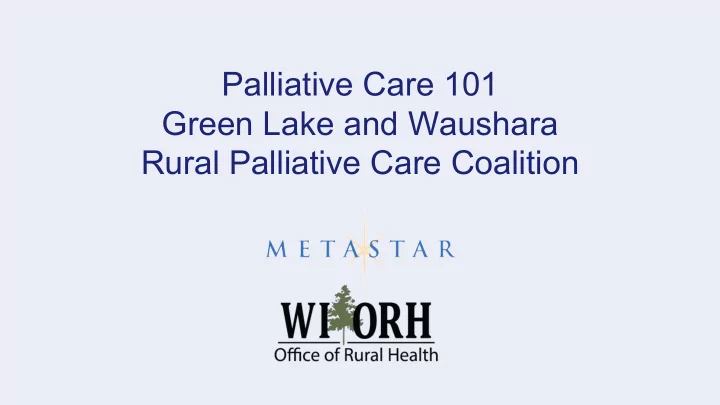

Palliative Care 101 Green Lake and Waushara Rural Palliative Care Coalition
Photo Courtesy: New York Times
Objectives/Focus • Define Palliative Care • Differentiation between Palliative Care and Hospice • Define the Palliative Care Team • Myths and Facts of Palliative Care • Who can Benefit from Palliative Care
What is Palliative Care? • Palliative Care is specialized medical care for people living with a serious illness. This type of care is focused on providing relief from the symptoms and stress of a serious illness. The goal is to improve quality of life for both the patient and the family. • Provided by a specially-trained team, palliative care specialists work together with a patient’s other doctors to provide an extra layer of support. Palliative Care is based on the needs of the patient, not the patient’s prognosis. It is appropriate at any age and at any point in a serious illness and can be delivered with curative treatment.
“Are they going Palliative?” Palliative Care is: • a recognized medical specialty • a philosophy of care and an approach to the care of seriously ill patients Palliative Care is NOT: • a place • a status Image: Sandor Weisz • limited by curative intent
How is Palliative Care Different from Hospice? Fruit Bowl Still Life Photograph By Paul Cowan
The Goal of Hospice • The patient agrees to stop treatments intended to cure • In return, the patient receives treatments and services designed to relieve suffering on many levels • Physical • Psychological • Social • Spiritual or existential
Non-hospice Hospice palliative care palliative care • Appropriate at any point in • Provides care for those in last a serious illness weeks/few months of life • Provided at the same time • Patients must have a two MD- as life-prolonging treatment certified prognosis of less than six months and give up • No prognostic requirement, insurance coverage for no need to choose curative/life prolonging between treatment treatment in order to be approaches eligible
Palliative Care… • Does not have to be offered in place of curative/disease- modifying therapy • Is not tied to a ‘place’ • Can be provided in/out patient • Integrated into Primary Care Physician (PCP) role or specialist level • Is not the same as hospice • Hospice is a form of palliative care • Hospice is the appropriate care when disease modifying treatment is no longer effective or wanted
Fr Interdisciplinary Palliative Care (PC) Team Members
Roles and Functions of PC Team Members
Palliative Care - Myths and Facts Myth: Palliative care is the same as hospice. Fact: Unlike hospice care, which is limited to the last six months of life, palliative care is appropriate at any age and any stage of a serious illness. It can be provided alongside of curative treatment. Myth: If you accept palliative care, you must stop other treatments. Fact: Your treatment choices are up to you. You can receive palliative care at the same time as treatment meant to cure you.
Palliative Care - Myths and Facts Myth: If I elect palliative care, I can no longer see my regular doctor. Fact: The palliative care team provides an extra layer of support and works in partnership with your primary doctor. Myth: Palliative care shortens life expectancy. Fact: Recent evidence shows that providing palliative care alongside standard care not only improves quality of life, but also extends the life of patients. This is particularly true when palliative care is added early in the illness.
Who can benefit from Palliative Care? Serious illnesses may include: • Cancer • Heart disease • Lung disease • Kidney disease • Alzheimer’s • HIV/AIDS • ALS • Multiple Sclerosis • Parkinson’s
Palliative Care Benefits Fewer Less Improved Fewer Emergency caregiver quality of symptoms Department exhaustion life visits and hospitalizations
What can I expect from Palliative Care? Symptoms Relief • Pain • Shortness of breath • Fatigue • Constipation • Nausea • Loss of appetite • Difficulty sleeping You can also expect close communication and more control over your care. In short, you can expect the best possible quality of life
How do I start Palliative Care? • You just have to ask for it! • Tell your doctors and nurses that you would like to see the Palliative Care team. • Check with your insurance to see if a referral is needed. Most insurances including Medicare and Medicaid cover palliative care.
To Find a Provider Near You • www.GetPalliativeCare.org • Ask your primary care provider
Questions?
Contact Details Name Organization Full address E-mail address Phone
Recommend
More recommend